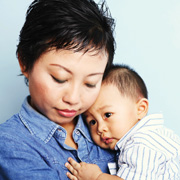Five months after the birth of her first child, Jennifer Carter began to realize that something was wrong. This Type-A, incredibly competent Yale grad was losing it. Despite support from her husband and her own parents, who lived just blocks away, she was not coping well with motherhood.  “I was having trouble eating and sleeping and concentrating,” says Carter. “My basic functioning was breaking down.”
“I was having trouble eating and sleeping and concentrating,” says Carter. “My basic functioning was breaking down.”
She sought help from her primary care doctor, who chalked it up to sleep deprivation. “He didn’t realize the severity of my symptoms. I think he just thought I was a weepy and emotional new mom,” Carter says. It took an ad in a publication for new mothers to get Carter on the right track. She met with a psychiatric nurse practitioner (PNP), then called her insurance company’s mental health intake line and was given a referral to a psychiatrist who specialized in postpartum depression (PPD). “When I saw her, she immediately diagnosed me and prescribed antidepressants,” says Carter. “It was the beginning of the road to recovery. I got some immediate relief with the medication in that I could start sleeping again and my appetite began to recover.”
Once the immediate symptoms started to subside, Carter could focus on what she needed to grow into a calm and happy mom. “I worked on little pieces of it, from going to a support group, joining a PEPS [Program for Early Parent Support] group, going to couple’s counseling with my husband,” and more. Carter befriended a mom who’d been through PPD, took walks, kept a journal, got help at home from a doula — anything she could think of. “No one piece was the trick that fixed me,” she says.
Abby Myers, the PNP who helped Carter, was moved to treat women with PPD because of her own experiences. “I had three children and I felt I had experienced postpartum anxiety with my second child, and knew my mother had had severe PPD,” Myers says.
Myers started going to conferences and got training, beginning in 1995, but at the time, mental health providers who specialized in PPD had to look hard to find information. “Back then,” says Myers, “there were only two books on the subject: Shouldn’t I Be Happy? and This Isn’t What I Expected.” Myers went on to serve as the director of Postpartum Support International (PSI) for six years, and is still associated with the group.
One out of 10 new moms
Fast-forward 15 years, and PPD is now PPMD—postpartum mood disorder—which encompasses much more than depression. It is recognized that at least one in 10 new mothers in the general population can experience some form of mood disorder. Symptoms can surface within days of delivery or build gradually within the first year. The risk is even higher for women in stressful socio-economic situations (57 percent) and teen mothers (30 percent–40 percent).
Symptoms can range from mild depression (crying, feelings of despair) to anxiety (physical pain, intense fear, nausea) to obsessive compulsive disorder or bipolar disorder (disturbing thoughts, ideas or images). In rare cases, PPMD can lead to psychosis, requiring immediate treatment that can include hospitalization and medication. (A full list of PPMD professionals in our directory.) Psychotherapist Heidi Koss, M.A., L.M.H.C.A., is the executive director of PSI of Washington and a two-time “survivor” of PPMD. Like Carter, Koss went through her treatment during the field’s fledgling years and has seen the positive changes that have developed.
Thanks to high-profile moms like Brooke Shields, whose book Down Came the Rain: My Journey Through Postpartum Depression helped open up the topic to a wider audience, the stigma of PPMD is lifting a bit. But Koss cautions that it still exists, especially in those cultural populations that have a hard time with things related to mental health. And then there’s the myth of the supermom, which makes mothers believe they’re “bad” because they can’t do it all.
“Until they get treatment, it’s like they’re looking through distorted goggles, so their reality perception is skewed,” says Koss. “They might be overly anxious about their baby, or they’re a hover-mother, and everyone is telling them to relax and chill out, but they can’t. They think, ‘This is so not what I signed up for,’ and they are ashamed of that. It can even happen with adoptive mothers. The shame goes even deeper because of the money and processes and hurdles to get the baby.”
‘I cried daily’
For Anne (not her real name), the birth of her second son brought a multitude of physical symptoms, including lightheadedness, heart palpitations, tingling fingers, nausea and random body aches.
“I was sure something was seriously wrong with me, because I didn’t think PPD would have such physical symptoms,” says Anne. “I felt so anxious and scared to be alone with my children, because I thought I might pass out or have something happen to me. I wasn’t sleeping well at night, and I had trouble sleeping when my baby slept. I was so frustrated with feeling dizzy all the time and I cried daily. I wasn’t enjoying my baby like I should have been, and I had a hard time coping with a lot of noise or crying from my kids.”
Anne spent two months bouncing from doctor to doctor, trying to find a physical cause of her symptoms — the first diagnosis: a virus and water in her ear. Exams by a second doctor and a naturopath showed nothing unusual, with the exception of moderate anemia and a vitamin D deficiency. Trips to a neurologist, an ear, nose and throat specialist and a third doctor followed, with no results. Eventually, she was prescribed the antidepressant Zoloft, but the side effects were so severe, she quit taking it.
A call to PSI’s “warm line” put Anne in touch with Abby Myers and on the path to recovery. Anne has been seeing Myers since July 2009 and made necessary changes to her lifestyle to help her cope. “First, I started taking an antidepressant, very slowly at first and built up to the therapeutic dose,” says Anne. “I began feeling relief from my symptoms in about six weeks. And I started taking better care of myself.”
Don’t ‘tough it out’
Some moms try to push through symptoms of PPMD by themselves, but that can be dangerous. Consider Maegan Blackwell’s case.
“I was aware that I was experiencing more than the ‘baby blues’ about two months postpartum,” she says, “and that I needed a more serious intervention about six months after my son’s birth.” At first, she sought help from her family doctor, who offered reassurances that things would get better. When Blackwell asked for a referral to a psychiatrist, she was told she was not “at that point.”
She began to experience the worst that PPMD can bring: thoughts of harming her child. “I knew I needed more serious help because I knew it was not normal to want to harm my son,” she says. “I knew I didn’t want to feel the way I felt, but didn’t know how to help myself.”
Blackwell’s mothering instinct prevailed, and she turned those thoughts of harming her son onto herself. “I became suicidal. That is when my family intervened.”
Blackwell was hospitalized and put under the care of social workers, therapists and psychiatrists. This team of specialists helped bring her back from the brink, and upon her release she began seeing Abby Myers for regular counseling and treatment. Today, Blackwell is weaning off medication, but still sees Myers a few times a year for a “check-in.” She also added lifestyle changes that include more sleep, talk therapy, exercise, change in diet, and changes in boundaries with family and friends.
It’s not your fault
All of the women mentioned in this story had similar words of wisdom for new moms who may be experiencing symptoms of PPMD: It’s not your fault.
“Don’t blame yourself,” says Carter. “You will get through this.”
“Talk with someone right away if you are not feeling like yourself or have unusual symptoms,” suggests Anne. “Realize that this will get better, that you will not feel like this forever.”
“You are not alone,” says Maegan Blackwell. “You will get well.”
“Call the PSI warm line [see below],” says Koss. “You need the support to get through this hard time.”
Abby Myers stresses the benefits of a support group (go to parentmap.com/more), and recommends reading The Mother-to-Mother Postpartum Depression Support Book by Sandra Poulin. “PPMD is very treatable and preventable,” says Myers. “It’s very sad that a woman doesn’t get all the help she needs, because there is help.”
Andrea Leigh Ptak is a writer and graphic designer based in South Seattle who would love to find a support group for parents of teenagers.
‘WARM LINE’
Postpartum Support International of Washington
800-404-7763
A toll-free telephone support line, community referrals, support groups and educational outreach for PPMD









